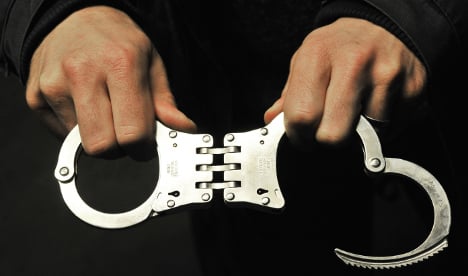For the first time, the Federal Criminal Police Office (BKA) released on Tuesday a report focused on how the large numbers of refugees and undocumented immigrants in Germany have impacted crime, recording data for the first three months of the year.
The number of crimes committed by refugees or migrants fell between January and March by more than 18 percent, according to the report.
The biggest drop-offs were in the number of property or forgery offences, thefts and crimes against sexual self-determination, which includes rape.
Thefts were the most common type of crime committed by migrants at 29 percent of the total, followed by property and forgery crimes (28 percent), and at 23 percent, bodily harm or crimes against another person’s personal freedom.
Sexual offences made up 1.1 percent of crimes.
The BKA report showed that a disproportionate number of offenders came from Algeria, Morocco, Georgia, Serbia or Tunisia.
And while Syrians, Afghans and Iraqis make up the majority of refugees in Germany, they are underrepresented in crime statistics.
Fears about the estimated one million refugees who fled into Germany last year creating an uptick in crime rose in the wake of the numerous sexual assaults committed in cities like Cologne on New Year's Eve.
Many women reported after the attacks that the men who assaulted them appeared to be of north African origin.
A spokesperson for the Interior Ministry told DPA on Wednesday that the report shows that migrants are “no more criminal than Germans.”
“This helps to keep the conversation objective,” he added.
The total number of crimes or attempted crimes that were committed by migrants so far this year reached 69,000 between January and March.
But the report emphasizes that “the vast majority of immigrants did not commit any crime”.
Crimes at refugee centres decreased by about ten percent during this time, and were mostly bodily harm offences, or crimes against someone’s personal freedom.
In cases of crimes against life – which made up 0.15 percent of all offences and includes murder or negligent homicide – in half of the cases the perpetrator and victim were the same nationality.
The report also documented crimes against migrants, and found that there had been a decrease in such offences of seven percent.
A troubling observation in the report was that the “evidence of connections to terrorist organizations increased”.
One ongoing investigation is related to a plot to bomb Düsseldorf.
A Syrian man suspected of aiding the plot reportedly told authorities that he was working with a sleeper cell hiding among refugees at a camp in the Netherlands.
The numbers of refugees arriving in Germany has sunk in recent months, though a report by German media on Tuesday also said half a million more refugees could ultimately come to join family members with asylum status in Germany.




 Please whitelist us to continue reading.
Please whitelist us to continue reading.